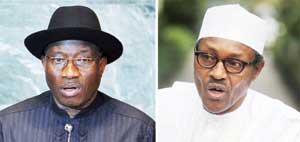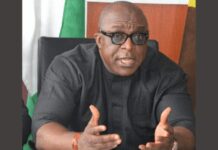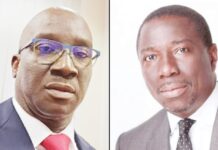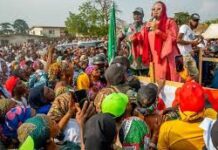Events since Nigeria’s last general election have led to a lot of things in the past four years. Though managers of Nigeria posture for a peaceful poll, the rest of the world takes their promises with a pinch of salt, and are therefore keener than before to observe events, reports Correspondent, SAM NWOKORO.
 Barely two weeks from now, Nigerians will once again go to the polls to elect someone that will lead them for another four years. That will kick off other elections for the next democratic dispensation. This particular election is seen as epochal, unlike previous elections. One, the presidential election comes first unlike in previous dispensation elections when contests for other lesser political offices were held before the presidential election.
Barely two weeks from now, Nigerians will once again go to the polls to elect someone that will lead them for another four years. That will kick off other elections for the next democratic dispensation. This particular election is seen as epochal, unlike previous elections. One, the presidential election comes first unlike in previous dispensation elections when contests for other lesser political offices were held before the presidential election.
With hindsight, it would appear to everyone that those who made that change saw well ahead the shape of things. The holding of presidential election first, notwithstanding whatever demerits, would go a long way in determining the future growth and stability of Nigeria, and consequently impact on her practice of plural democracy. No Nigerian, even outsiders, need in-depth illustration of this very fact.
Another factor that makes the next general election special is the attention Nigeria’s friends are giving it. More international observers are monitoring this one than what obtained before. Even more local observers are also monitoring, despite security concerns.
The third factor that makes this election special is the pre-election issues that has taken place in Nigeria: the Boko Haram nuisance, which reared its head in 2009, assumed a monster status – threatening national security, global high grade terror activities previously unknown in Nigeria, but which Boko Haram has effectively been streamed into, and which concomitantly has led major Nigerian foreign allies to almost label Nigeria a ‘terrorist state’, with all the multiple implications that go with it, and of course the “apprehension” that if the election ends in a fiasco, then Nigeria may as well change its present form and structure.
These and more make the presidential election slated for February 14 deserving of global attention it is currently receiving.
The Kerry visit
Late last week, the U.S. Secretary of State, John Kerry, was in Nigeria as part of Washington’s efforts to ensure Nigeria had a peaceful presidential poll. He held talks in separate sessions with Nigeria’s two main presidential aspirants, President Goodluck Jonathan of PDP and Muhammadu Buhari of APC.
Media accounts reveal that Kerry pushed for both candidates’ co-operation with election managers to do their job unfettered, by their individual behaviours, so that a free and globally-acceptable result from the election. It was a reiteration of an earlier push by the United Nations (UN) emissaries headed by former Secretary-General, Kofi Annan, who got the two main presidential aspirants and their party representatives to sign a peace deal to maintain orderly conduct from now through the election period and afterwards.
The coming of Washington on the heels of Nigeria’s preparations for a new political dispensation, according to observers of Nigeria-U.S. relations, underscored the fact that before Washington, Nigeria matters.
During the separate meetings, the top envoy reportedly said: “The fact is that one of the best ways to fight Boko Haram and similar groups is by protecting the peaceful, credible and transparent elections that are essential for any thriving democracy. And certainly, it is essential to the largest democracy in Africa. It is essential that these elections happen on time as scheduled.
“There have been improvements over past elections, and a need to set new standards for this democracy. That means that Nigerians do not only have to reject violence, but have to actually promote peace.
“Violence has no place in democratic elections, and I can guarantee you that the perpetrators of such violence will not be welcomed in the United States of America. Nigeria is Africa’s most populous nation, and one of the world’s largest democracies. It is blessed with some of the planet’s most valuable and abundant natural resources.”
He emphasised that anyone who participates in plans or calls for widespread or systematic violence against the civilian population must be held accountable, including being ineligible for a U.S. visa.
Kerry added: “I came here today to deliver a very simple message, and I met with both major candidates in order to underscore that the international community is paying very close attention to this election and is deeply committed to working with Nigerians, with the hope that they will have elections that are free of violence, and capable of instilling confidence in the future.”
On Boko Haram, he expressed dismay that day after day, the group continues to kill scores of innocent civilians, and attacks villages and military installations in places like Borno, Yobe and Adamawa states.
“The United States condemns these attacks, which have escalated in recent weeks and extend our deepest condolences to the thousands of families that have been impacted and we deeply regret the toll that this violence is taking on the Nigerian people.
“We will absolutely continue to support the Nigerian military in its fight against Boko Haram. All of us must come together to strategise to stop the (terrorist) groups, but they (politicians and aspiring ones) must address the environment from which these groups emerged,” he pledged.
Kerry praised the series of regional security efforts in Africa so far, even as their impact has not stopped terrorism.
His words: “We were very happy to see Nigeria host a regional security meeting last week (penultimate week) to discuss how to better coordinate counter-terrorism method. This is exactly the kind of thing I suggested as necessary a couple of weeks ago. It is very important that the world cooperates more in helping countries where they don’t have the capacity to step up and take up lawless terrorist entities.
“That is precisely why President Obama has announced that next month (February) in Washington, we will host an international summit on combating violent extremism around the world. It would be held at the White House at the ministerial level, and we hope to bring people together who have been engaged in this fight against Boko Haram and other entities, so that we can share best practices, so that we can hear from people about what they need and what they think is necessary in order to be able to summon an even global response.”
Reaping from Kerry’s visit
It would appear that Kerry’s peace meeting with the presidential candidates last week had some angelic touch on Nigeria’s fight against insurgency, aside the political sermons. No sooner had he left Marina Lagos for Washington than a string of capitulation hit the terrorists’ camps. Twenty four hours after the envoy’s departure, the terrorists voluntarily released some 192 hostages. This came shortly after the two main presidential candidates expressed their determination to heed the envoy’s message, which has been generally interpreted as a clear warning that Washington is getting fed up with Nigeria’s Boko Haram jigsaw, and might act drastically if it is discovered that political rascality is fuelling the insurgency.
Reports had it that 192 out of 218 people abducted by Boko Haram in Katarko town in Gujba Local Government Area of Yobe State were released by their captors last week. The following day, the Nigerian military recorded another major victory over the insurgents in Maiduguri, Borno State, during which some high calibre munitions and surface-to-air tanks were recovered.
Also, the two presidential candidates came out to declare openly that there would be no shifting of the poll date, as had been speculated by some people, for a shift of the poll to enable INEC adequately prepare, or to allow time for the insurgency in the North East to abate.
Serious observers
Perhaps, owing to the importance the watching world attaches to the general election, many observers have indicated interest in the monitoring of the poll. All of Nigeria’s major allies – U.S., Britain, EU, UN, Canada, Japan, Germany, Ireland and France –are all sending monitors, some even more than one group. There are other 72 local observer groups topped by the global African Union (AU) development partner, New Partnership for African Development (NEPAD).
The major international observer bodies include: U.S. Embassy, International Foundation for Electoral Systems (IFES), EU, the Embassy of Switzerland, British High Commission, UN Women, German Embassy, French Embassy, Embassy of Japan, High Commission of Canada, and Embassy of Ireland.
All of the major big countries observing had one way or another, in the recent past, been victims of global terror attacks. Japan, only last week, had one of her citizens executed by ISIS fundamentalist, after it could not meet the terrorists’ demand of $200 million ransom to let the two hostages go. France is still reeling in the pains of Charlie Hebdo’s assassination by terrorists in Paris early in the year, one action that sparked global revulsion against fundamentalists-inspired terrorism.
Assessing the past
Commenting on past Nigerian election conduct, especially the 2011 edition, one of the international observer groups, the U.S.-based National Democratic Institute (NDI), said: “Nigeria’s just-concluded presidential and National Assembly elections represents a step further from seriously flawed elections of the past, and holds the promise of setting a new standard of integrity in Nigeria’s electoral process.”
Another one, International Republican Institute (IRI), a top global democracy and freedom advocacy group, says: “IRI found that the April 16, 2011 presidential election was a major step forward in advancing Nigeria’s democracy. Under the capable leadership of chairman of INEC, the election over all was transparent and orderly, allowing Nigerians the opportunity to exercise their right to vote. Chairman Jega and his team have made great strides in improving the quality of Nigeria’s elections, and deserve credit for what has been achieved in the short eight months since they were appointed.”
The AU said “the free and fair conduct of the 2011 election by Jega and INEC raises hope for the rest of Africa on growth of democracy”.
Hillary Clinton, U.S. Secretary of State in 2011, said: “This historic event marks a dramatic shift from decades of failed elections and a substantial improvement over the 2007 presidential election. While this election was a success for the people of Nigeria, it was far from perfect. We urge the INEC to transparently review and take appropriate and transparent action on allegations of under-aged voters, violence and intimidation, ballot stuffing and inordinately high turn-out in some areas of the country.
“The U.S. condemns the acts of violence related to elections and we call upon all candidates, political parties and their supporters to respect the result of the election and channel any grievance or challenge it peacefully through established administrative and legal process.”
Similar admonition and advocacy is also attending this one as much as fear and anxiety. EU-EOM has already said the strategic body would not be monitoring the elections in the North East. Speaking through its chief, Ambassador Santiago Fisas, EU-EOM, which has been in Nigeria since November 2014 for the elections, disclosed that 30 observers were already in the country, while the remaining 60 will come in by February 7.
“Over 90 election observers have been deployed in the country to monitor the forthcoming election in all the states, but they will not cover the North East because of activities of insurgents in the zone,” Fisas said.













